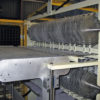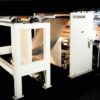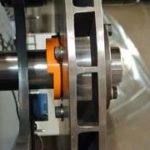In a move to market its product more competitively, a manufacturer of pressure-sensitive materials recently upgraded its sheeting operation with a precision sheeter and doubled the capacity of its sheeting operation while reducing labor requirements by more than 50%.
General Formulations, Sparta, MI, has produced pressure-sensitive materials since 1950. The company caters to both short-and long run orders.
With five coating units, six slitter/re-winders and a sheeter, General Formulations has the equipment to do just about anything in the pressure-sensitive area.

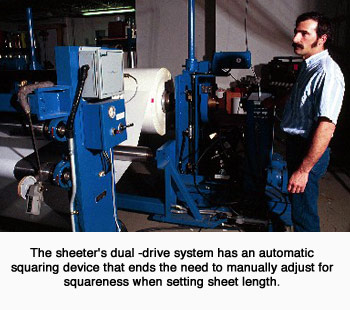 “There isn’t anything we won’t try to make,” Ernie Barty, company production manager, said. “being a small company, we are known for our specialty work. Our customers say we are more time-sensitive and quality-conscious because of this emphasis.”
“There isn’t anything we won’t try to make,” Ernie Barty, company production manager, said. “being a small company, we are known for our specialty work. Our customers say we are more time-sensitive and quality-conscious because of this emphasis.”
The majority of General Formulation’s customers are screen, offset and flexo printers. They are located through-out the US as well as England, Canada, Mexico, the Far East, Australia and New Zealand.
The company also manufactures polished vinyl for advertising signs and static-cling vinyl sheet. Products are available in sheets or rolls.
To meet customers’ demands for sheeted vinyl and polyester stock, General Formulations has sheeted internally since the company was established. While its existing equipment met demand for many years, it was limited by 1950s technology. The need to stay competitive prompted General Formulations to look at a more-efficient method of operation.
“In the pressure-sensitive industry, price is very important,” Barty said.
 “This forced us to explore better ways of doing things. For example, our sheeters were designed to handle only narrow webs. In contrast, a new sheeter would give us the ability to handle a wider web and slit it down the middle.”
“This forced us to explore better ways of doing things. For example, our sheeters were designed to handle only narrow webs. In contrast, a new sheeter would give us the ability to handle a wider web and slit it down the middle.”
Reducing waste was one way General Formulations could lower costs. “While sheeting pressure sensitive, 75% of our cost is the material,” Barty said. “On our older sheeters, we could set the sheet length only to the nearest ¼ in., which meant we had to oversize by a ½ in. and then guillotine trim. If we could reduce this scrap, we could operate more cost-effectively.”
During its investigation of sheeting equipment, the company reviewed several designs, running trials on equipment to gauge sheet-length accuracy and run ability. It selected the MSS-HS sheeter from Maxson Automatic Machinery Co., Westerly, RI.
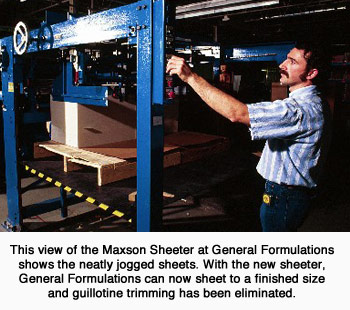 “This machine’s sheet length held good control,” Barty said. “We liked the creativeness of the manufacturer’s engineering department, their willingness to try to accommodate our needs and that it was American made.”
“This machine’s sheet length held good control,” Barty said. “We liked the creativeness of the manufacturer’s engineering department, their willingness to try to accommodate our needs and that it was American made.”
The sheeter has a twin-motor drive system that utilizes state-of-the-art technology. The design’s advantage is it provides press-ready sheets regardless of cutoff.
For General Formulations, this means a reduction in waste. “Sheet length is infinitely variable, so we can select whatever size we need,” Barty said. “Maxson’s dual-drive system gives us the accuracy we require. Nobody holds better sheet-length tolerances.”
The twin-motor drive system is designed for ease of operation. Size changes are keyed in at the operator console. The drive package includes an automatic-squaring device that ends the need to manually adjust for squareness.
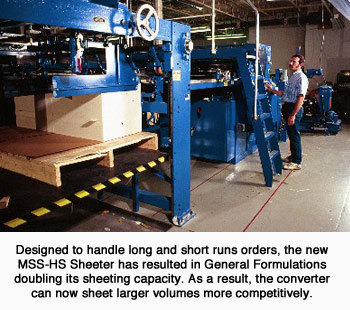 “The drive system is very simple to operate,” Barty said. “Our operator can set sheet length in less than a minute.”
“The drive system is very simple to operate,” Barty said. “Our operator can set sheet length in less than a minute.”
In selecting a sheeter, General Formulations chose options that would boost overall efficiency. A shaftless self-loading roll stand eliminates the need for an overhead hoist when loading rolls. As the operate moves the roll into position, the roll stand cradles the roll and lifts it into position.
A roll change is completed in under 2 min. The shaftless roll stand has an automatic tension-control feature to ensure sheet-length accuracy.
The MSS-HS sheeter handles pressure-sensitive paper, polyester and vinyl in thicknesses from 1 mil to 10 mil. It offers a sheet-length range from 13 in. to 60 in. and handles rolls up to 59 in. wide. “With our older sheeters, the widest we could handle was 36 in. Over the past few years, there’s been a shift in the printing industry toward wide-web work,” Barty said. “With the Maxson, we can capitalize on this business.”
This view of the Maxson Sheeter at General Formulations shows the neatly jogged sheets. With the new sheeter, General Formulations can now sheet to a finished size and guillotine trimming has been eliminated.
“Another area of improvement has been increased production. “The MSS-HS has totally changed our way of thinking,” Barty said. “We recently sheeted a job in four hours, which would’ve taken three days on an older sheeter. The overall quality is better.
“We’ve doubled our production while reducing our labor requirement from six operators to two. Even so, we have yet to fully utilize the sheeter’s potential because of our small order sizes,” he said. “On average, we have up to 10 size changes daily.”
However, General Formulations’ order mix is undergoing a change to include more lucrative long runs. Orders like these offer opportunities for growth. “The Maxson gives us the flexibility to work both ways,” Barty said.
“While continuing our emphasis on short-run specialty work, we can sheet larger volumes competitively.”
Designed to handle long and short runs orders, the new MSS-HS Sheeter has resulted in General Formulations doubling its sheeting capacity. As a result, the converter can now sheet larger volumes more competitively.
A commitment to quality and service is one reason behind General Formulations’ success over the past 40 years. The Maxson sheeter complements this philosophy. “We’re operating more efficiently, and the overall quality is better,” Barty said. “As additional business opportunities develop, we have the equipment, people and facilities to continue our tradition.”
Reprinted from Paper Film Foil Converter, April 1993


